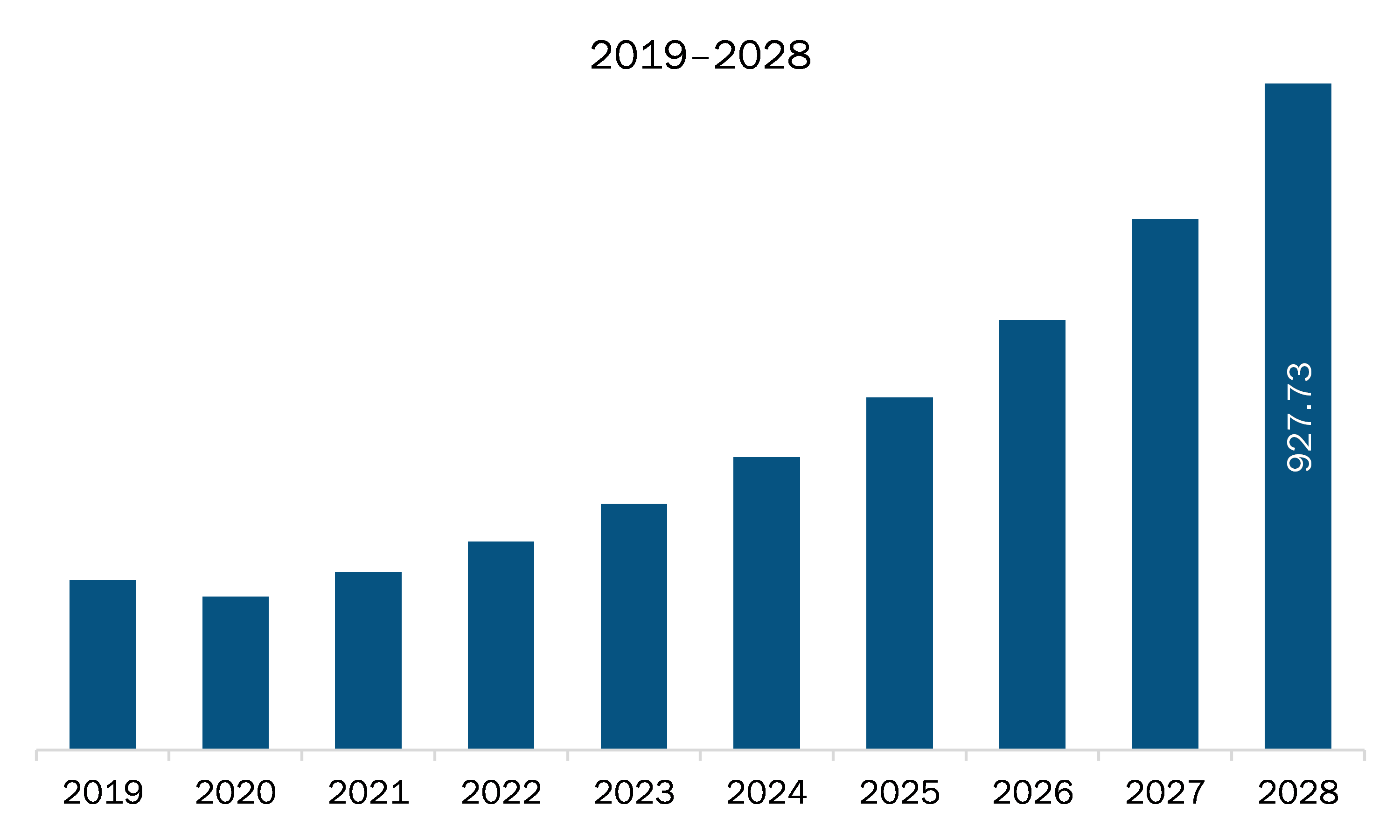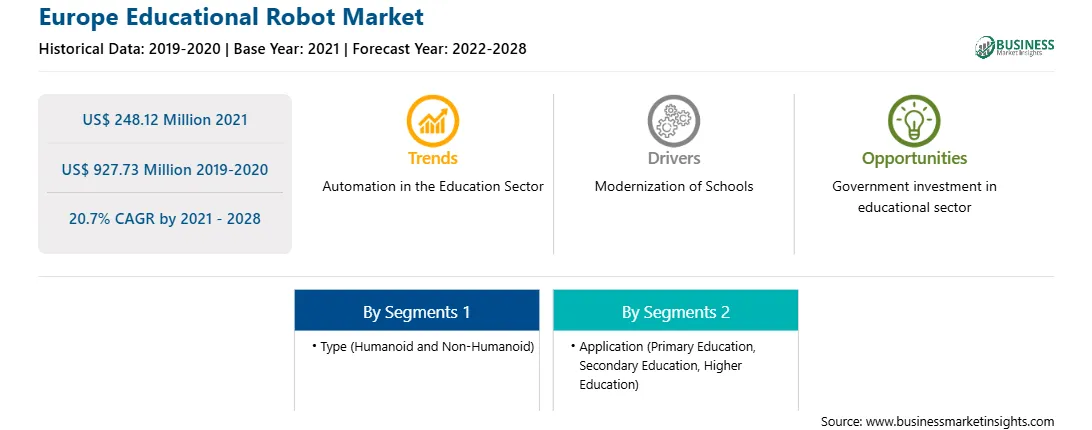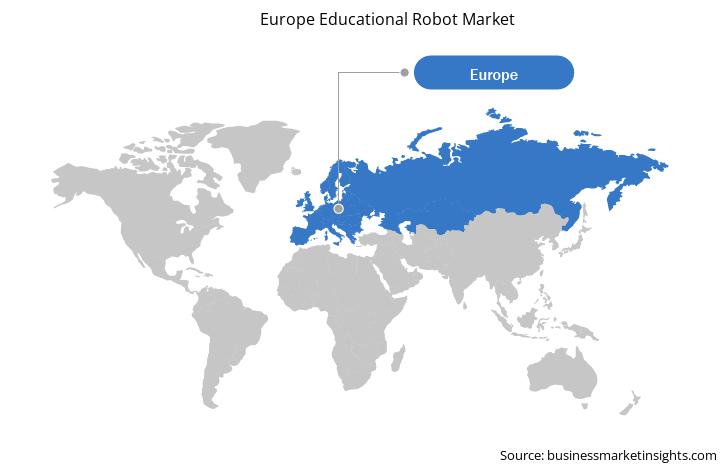The European government is taking various initiatives to equip European citizens with advanced technology in the field of education and training. Education robots are increasingly used across all the European countries from school to higher education, as well as adult training and vocational learning, although the penetration of technology varies in different sectors of education & training from country to country. In Europe, educational robots are significantly used to teaching foreign languages owing to the high presence of the refugee student population. Further, the increasing need for STEM education is expected to drive the educational robot market in the region. It is anticipated that there will be a requirement for ~1 Mn additional STEM researchers, as per European Schoolnet. In 2017, Swiss Federal Institute of Technology Lausanne, Switzerland, launched a Robots4school project dedicated to encouraging innovation in teaching. More than 40,000 Thymio robots have been already sold, chiefly to schools, as of 2018. In 2018, the Computational Thinking Initiative for education, supported by the teachers’ federation, was launched in Switzerland, which uses Thymio robots. In 2018, AV-1, a Norwegian start-up, designed a small robot, No Isolation, a telepresence robot for children as well as young adults suffering from a long-term illness. These robots sit in the classroom so that they can offer the same teaching to children on their bed at home or in the hospital, as well as to stay connected with school friends. Moreover, Attymass National School in Romania demonstrated the use of educational robots for teaching. The Ireland’s 2018 Action Plan for Education’s School Excellence Fund aims at providing support to schools for introducing digital technology for encouraging computational thinking" among the children. Also, Hibernia College in Ireland piloted the use of a “Swivl” robot to monitor the performance of trainee teachers.
Europe is a one of the key regions for the growth of educational robot market with the presence of many developed countries such as Germany, UK, France, Italy, Norway, and Sweden, where education spending is quite high in comparison to other regions coupled with high investments in robotic startups. Also, the high adoption of advanced technology solutions in various industries makes this region an ideal market for the growth of educational robot market. All these countries are characterized by the presence of large number of companies, especially in the education technology sector. Presently, Russia, UK, Spain, Italy, Germany, Turkey, and France are some of the major countries that are affected in a negative manner due to COVID-19 outbreak. Due to COVID-19 outbreak, the governments in various European countries have imposed lockdowns/movement restrictions and closed the educational institutions to contain the outbreak. This is expected to negatively impact the demand of educational robots from these institutions. Moreover, the rapid spread of the covid-19 infection has also disrupted the supply chain of the market thereby negatively impacting the growth of the market

Strategic insights for the Europe Educational Robot provides data-driven analysis of the industry landscape, including current trends, key players, and regional nuances. These insights offer actionable recommendations, enabling readers to differentiate themselves from competitors by identifying untapped segments or developing unique value propositions. Leveraging data analytics, these insights help industry players anticipate the market shifts, whether investors, manufacturers, or other stakeholders. A future-oriented perspective is essential, helping stakeholders anticipate market shifts and position themselves for long-term success in this dynamic region. Ultimately, effective strategic insights empower readers to make informed decisions that drive profitability and achieve their business objectives within the market.

| Report Attribute | Details |
|---|---|
| Market size in 2021 | US$ 248.12 Million |
| Market Size by 2028 | US$ 927.73 Million |
| Global CAGR (2021 - 2028) | 20.7% |
| Historical Data | 2019-2020 |
| Forecast period | 2022-2028 |
| Segments Covered |
By Type
|
| Regions and Countries Covered | Europe
|
| Market leaders and key company profiles |
The geographic scope of the Europe Educational Robot refers to the specific areas in which a business operates and competes. Understanding local distinctions, such as diverse consumer preferences (e.g., demand for specific plug types or battery backup durations), varying economic conditions, and regulatory environments, is crucial for tailoring strategies to specific markets. Businesses can expand their reach by identifying underserved areas or adapting their offerings to meet local demands. A clear market focus allows for more effective resource allocation, targeted marketing campaigns, and better positioning against local competitors, ultimately driving growth in those targeted areas.

The educational robot market in Europe is expected to grow from US$ 248.12 million in 2021 to US$ 927.73 million by 2028; it is estimated to grow at a CAGR of 20.7% from 2021 to 2028. Rising demand for robots for learning language, The humanoid robots are identical to the human features and interacts with social tools and the environment. Human-Robot-Interaction has gained considerable attention at research centers and educational institutes. The robots are not just powerful tool for STEM education but has also been used across various countries for developing communication skills among children as these robots can be integrated with various languages. With the innovative teaching methods and the increasing adoption of humanoid robots across the primary to higher education, vendors have a huge opportunity for humanoid robots during the forecast period. This is bolstering the growth of the educational robot market.
In terms of type, the non-humanoid segment accounted for the largest share of the Europe educational robot market in 2020. In terms of application, the higher education segment held a larger market share of the educational robot market in 2020.
A few major primary and secondary sources referred to for preparing this report on the educational robot market in Europe are company websites, annual reports, financial reports, national government documents, and statistical database, among others. Major companies listed in the report are Aisoy Robotics; Lego System A/S; PAL Robotics; Sanbot Innovation Technology., Ltd; SoftBank Robotics Group Corp. among others.
The Europe Educational Robot Market is valued at US$ 248.12 Million in 2021, it is projected to reach US$ 927.73 Million by 2028.
As per our report Europe Educational Robot Market, the market size is valued at US$ 248.12 Million in 2021, projecting it to reach US$ 927.73 Million by 2028. This translates to a CAGR of approximately 20.7% during the forecast period.
The Europe Educational Robot Market report typically cover these key segments-
The historic period, base year, and forecast period can vary slightly depending on the specific market research report. However, for the Europe Educational Robot Market report:
The Europe Educational Robot Market is populated by several key players, each contributing to its growth and innovation. Some of the major players include:
The Europe Educational Robot Market report is valuable for diverse stakeholders, including:
Essentially, anyone involved in or considering involvement in the Europe Educational Robot Market value chain can benefit from the information contained in a comprehensive market report.